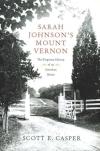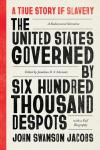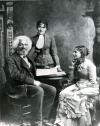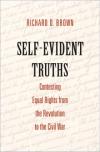African American Studies

|
Northern Visions of Race, Region, & Reform | This online resource documents conflicting representations of African-Americans, white Southerners, and reformers during and and immediately after the Civil War. In particular, it looks at the stereotypes popularized in the northern press, and the ways that these depictions were countered--or in some cases, reinforced--in the letters written for northern readers by freedmen's teachers and freedmen themselves. |

|
Photographs of Tuskegee Institute | The American Antiquarian Society has a collection of fifty-six photographs depicting life in and around Tuskegee Institute, in Tuskegee, Alabama, ca. 1890-1915, taken by an unknown photographer. The campus, now known as Tuskegee University, is depicted here during the tenure of the school’s first president Booker T. Washington. Under Washington's leadership, students learned trades while also constructing the school's buildings brick by brick. |

|
Revisiting Rebellion: Nat Turner in the American Imagination | Using print and manuscript collections at the American Antiquarian Society and the New York Public Library’s Schomburg Center for Research in Black Culture, this exhibition explores portrayals of Turner in both the nineteenth and twentieth centuries. Depictions often reveal less about who Turner was and more about the zeitgeist in which a given Turner was created. |

|
African American Cultures of Print | Led by Lara Langer Cohen and Jordan Stein |

|
Finding Sarah Johnson's Mount Vernon: Behind the Stories at an American Shrine | Scott Casper will return to Antiquarian Hall to describe the process of researching and writing his latest book, Sarah Johnson's Mount Vernon (Macmillan, 2008) It is a process that began in the collections of the Society ten years ago. In this work Casper recovers the remarkable history of former slave Sarah Johnson, who spent more than fifty years at Mount Vernon, before and after emancipation. Through her life and the lives of her family and friends, Casper provides an intimate picture of Mount Vernon's operation during the nineteenth and early twentieth centuries. |

|
No Longer Yours: The Lives of John Swanson Jacobs | The remarkable story of John Swanson Jacobs—lost for 168 years—was rediscovered in 2016 by historian Jonathan Schroeder. In a conversation with AAS member Manisha Sinha (elected October 2006), Schroeder will discuss his incredible discovery of Jacobs’s first-person slave narrative, The United States Governed by Six Hundred Thousand Despots, first published in Australia in 1855. |
| An Inside Story of African American Imprisonment before Emancipation: Austin Reed's 'The Life and the Adventures of a Haunted Convict' by Caleb Smith | Caleb Smith will discuss the memoir of a free black man from Rochester, New York, who spent most of his early life in the juvenile reformatories and state prisons of the antebellum period. Discovered in 2009 and recently published by Random House, Austin Reed's "The Life and the Adventures of a Haunted Convict," gives an inside account of the origins of the American prison system, providing a link between slavery and mass incarceration. |
|
| Did Nat Turner 'confess' | This program will explore the slave rebellion led by Nat Turner in August 1831. Patrick Rael will offer a new interpretation of Turner’s purpose and assess the significance of the rebellion for the national argument over slavery then underway. Ultimately, he argues, one of the least overtly “political” of all slave rebellions had political consequences that led to the breakdown of the union and the civil war that set African Americans free. |
|

|
The Matter of Black Lives: Writing the Biography of Frederick Douglass and His Family | What is family? How does it lend itself to the writing of biography? What particular challenges does the writing of family biography present when the family in question is African American? Finally, how might the task change as we move from the Obama Years into the Trump Years in our national history? |

|
Equal Rights May Be Self-Evident, But Have They Been Realized? | Despite our country’s founding statement that “all men are created equal,” the early Republic struggled with social inequality. Although Americans paid homage to the ideal of equal rights, this ideal came up against entrenched social and political practices. In this talk based upon his latest book, Self-Evident Truths: Contesting Equal Rights from the Revolution to the Civil War, Brown will discuss how the ideal was tested in struggles over race and ethnicity, religious freedom, gender and social class, voting rights and citizenship. |